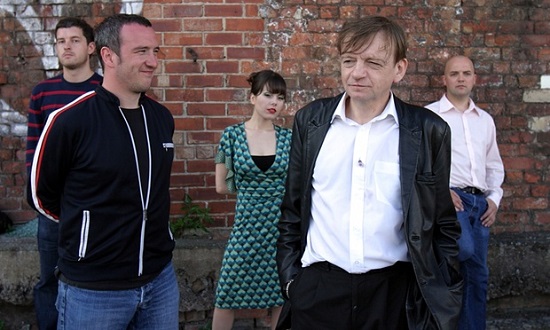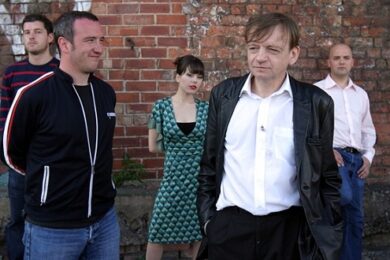The post-punk conference hosted by Leeds’ Performance and Cultural Industries Unit took place over a day in early September, with Paul Morley, pioneer and proud rehabiliator of the first person address in journalism, as keynote speaker. Elsewhere, after an introduction by organisers Philip Kiszely and Alice Bayliss, we explored Birmingham sociology, enjoyed a feminist perspective on Breaking Glass, and eyeballed an impressive display of punk-era graphic design while cogitating on accounts of The Fall and Throbbing Gristle. Lucy O’Brien spoke about studying at this very campus to the agit-prop feminist soundtrack of the Delta 5, amid curfews for female students with the Yorkshire Ripper still at large. And I waffled about independent labels to the unbridled joy of my publisher. John Cooper Clarke was a highly appropriate choice to provide an evening’s entertainment for the saddle-sore.
Morley, toting a thick wad of A4, flipped through random thoughts and notes from published articles, including the occasional set-piece such as his breathless sermon denouncing the Arctic Monkeys and Franz Ferdinand. Their perceived mimicry was contrasted to the militant artistic separatism of the Gang of Four, Josef K and Monochrome Set. Are these reactionary replicants indeed such empty vessels, traducing the rich stylistic traditions of the class of ’78 into rote formulae, as Morley suggests? I can think of several more deserving targets. Regardless, it’s good to see the old boy work up a froth, and he’s prescient in recognising how quickly journalism becomes the cement of history, fixing perception until that necessary moment when the revisionary coat of paint is required. And sometimes over-liberally applied.
Dave Haslam, author and former Hacienda DJ, contrasted the way the civic elders of Manchester and Birmingham have curated their respective cultural achievements. He cites The Prefects and March 1977 as the moment post-punk took root in Brum (which I would protest, chronologically and thematically). He’s at his best exploring the connections that led Birmingham’s punk generation through to new romanticism. Which, again, is now also seen as a post-punk trope. Dave Rimmer’s excellent history of the New Romantics, it should be remembered, bore the title Like Punk Never Happened. Everything’s getting pretty blurry.
This highlights a central problem with the elephant in the room and dominant text underpinning the conference: Simon Reynolds’ Rip It Up And Start Again is a near ubiquitous reference point. His re-branding of the era conveniently provides near limitless subject matter and intellectual elbow room. To his credit, Reynolds was honest enough in announcing his solipsism, in so far as Rip It Up addresses those elements of post-punk that appeal to him. I would imagine he would be surprised to find his broader concept of post-punk has become doctrinal — at least where it collides with existing chauvinisms.
There’s a parable here about the way some artists and writers ducked in and out of the punk frame as fashion dictated, and the same thing seems to be occurring with post-punk. Soon, doubtless, we shall have a fresh backlash and convoluted tautological expressions such as pre-post-punk. But we’re still not hearing enough about the enduring influence of those grubby Potteries herberts Discharge, nor on unheralded brands such as UB40 or XTC, or the cow-punk scene, or the tape-traders. See also: the ‘unfashionable’ end of goth (in which space the unacknowledged UK Decay were as important a bridge between the punk and goth communities as the Banshees). An aside here; one of the speakers was adamant that she was a ‘positive punk’ — a tiny historical anachronism of a genre — and never a ‘goth’, proving that these definitions and their baggage still resonate down the years.
The problem is not with what Reynolds left out of Rip It Up . . ., but, paradoxically, that too much was left in. ZTT was a jolly wheeze, but that was surely a pop moment. And at the other end of various spectra, not least sonic, didn’t Throbbing Gristle pre-date the Pistols? ‘Post-punk’ seems a hopelessly inadequate umbrella term to encompass both. The confusion extends beyond Blighty. Television and Talking Heads — both Reynolds favourites — were part of America’s indigenous original punk scene that foreshadowed (and, depending on your reading of the runes, and your prejudices, inspired) the Pistols.
So why does post-punk work so well as a brand when its content remains amorphous? Reynolds himself defined it as "less a genre of music than a space of possibility". Yet we can’t lose sight of the fact that the Latin qualifier means after, subsequent or later. Some limitation on duration is also necessary, though application can’t be merely calendar-defined. We have to respond to the term with some reference to musical discipline and its entanglement with punk itself. Is there a compelling argument for digesting the period 78-82 as a single musico-sociological unit? I know not of such a beast. Unless you deconstruct the repeated message broadcast from 1978 onwards that punk was ‘dead’ and that a new dawn was implicit from that point. But punk wasn’t dead. Some of its most critical interventions still lay ahead.
Yes, it’s true that punk’s impact may have been mythologised and perhaps that required redress. But punk as a music is defined in much narrower terms now than it was during the 76-79 period. To see it as some form of bill of limitations (or as ‘retarded’, as Reynolds at one point suggests) is inaccurate. He states that punk "proved a rejuvenating shot in the arm to the established record industry that the punks had hoped to overthrow". The emphasis on this ‘failure’ undersells the very real success of the independent music culture that grew like weeds in the rubble and without which no-one would ever have heard of the Delta 5 — if indeed they would ever have picked up instruments in the first place.
This cherry-picking of the more progressive voices from the punk era unfairly diminishes the parental culture’s diversity and vitality. Contemporaneously — and even though each had a complicated narrative engagement with the term — Wire, The Slits, The Fall, ATV etc were consumed as punk. They can only be understood as post-punk retrospectively. You could barely read a music-related article between 1977 and 1979 that didn’t mention ‘punk’ — often as a kind of barometer. I’m prepared to be gainsayed, but I would guess you would struggle to find more than a few dozen references to ‘post-punk’ in the same period. It’s hard to think of many other musical sub-genres that were named — or conceptualised — after the event.
Punk begat vast dissonance and fragmentation. There are no means by which the wealth of music thus engendered in the period 78-84 (to use Reynolds’ own parameters) can be adequately unified. It was all too untidy (and thrilling, as Reynolds conveys well). On the basis of reactions here, post-punk has become a little akin to the Human League’s ‘Black Hit Of Space’, sucking everything into its orbit. Let’s look again at some of the musical subjects this conference tackled: Throbbing Gristle, Orange Juice, Hazel O’Connor, the Fleshtones, Frankie Goes to Hollywood, Mission of Burma. It would make for an interesting mix tape. But you can’t imagine too many fans of each artist ever gathering in the same room.
Anyway, we retire to the pub. The Fenton, no less, where the cologne of post-punk’s history has impregnated the walls, to borrow a Cooper-Clarke-ism. It’s here that Green Gartside and the Mekons and Gang of Four supped and scrapped (with the National Front). So, did today’s events move the debate forward? Answers on a thesis.
Discussions about establishing a new academic periodical covering punk and post-punk emerged post-conference. If you are interested in contributing, please drop a line to Dr Philip Kiszely (p.kiszely@leeds.ac.uk)
_Alex Ogg’s excellent study of UK independent labels Independence Days is out now._



